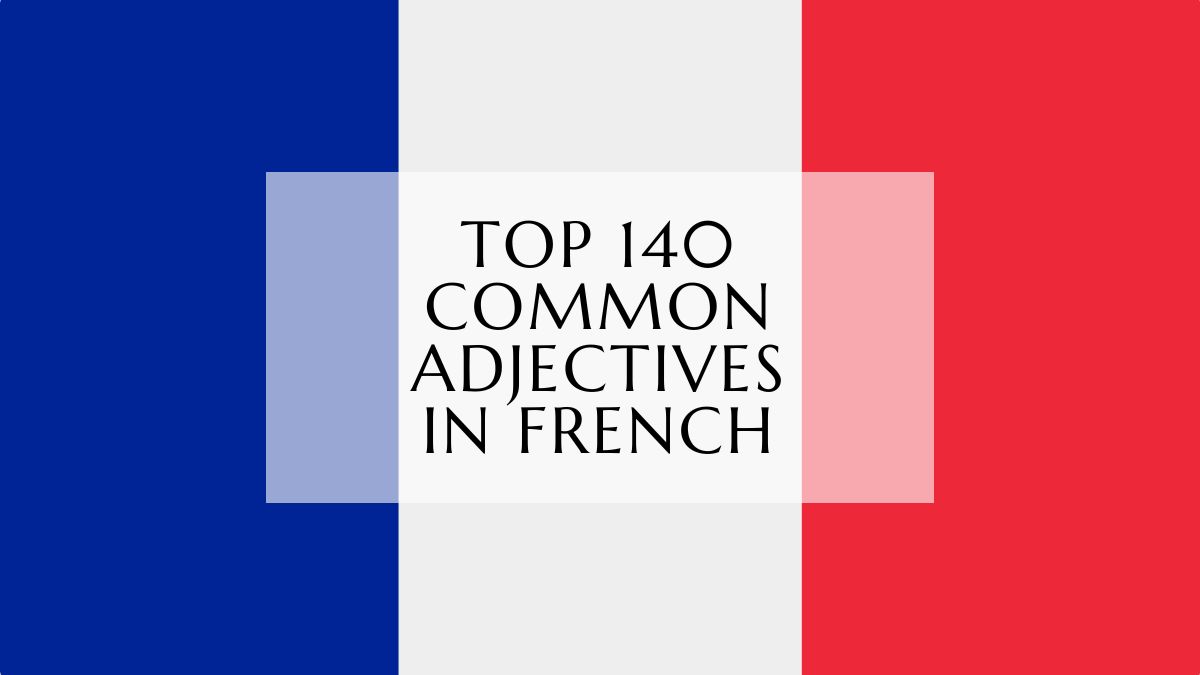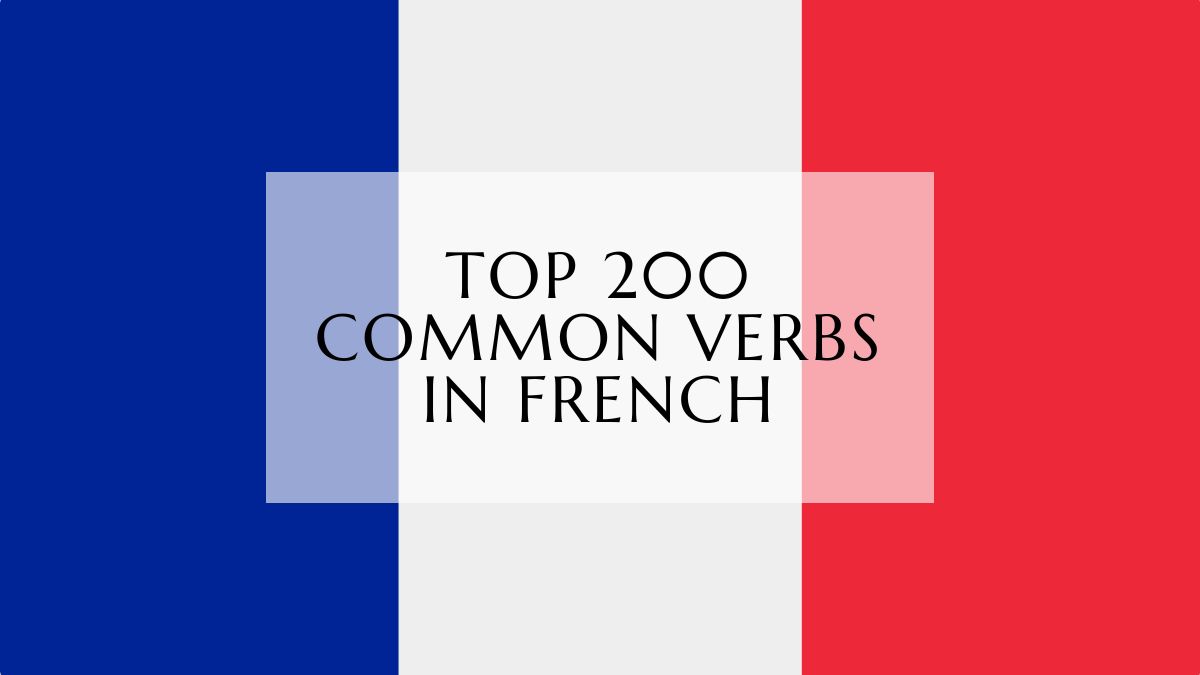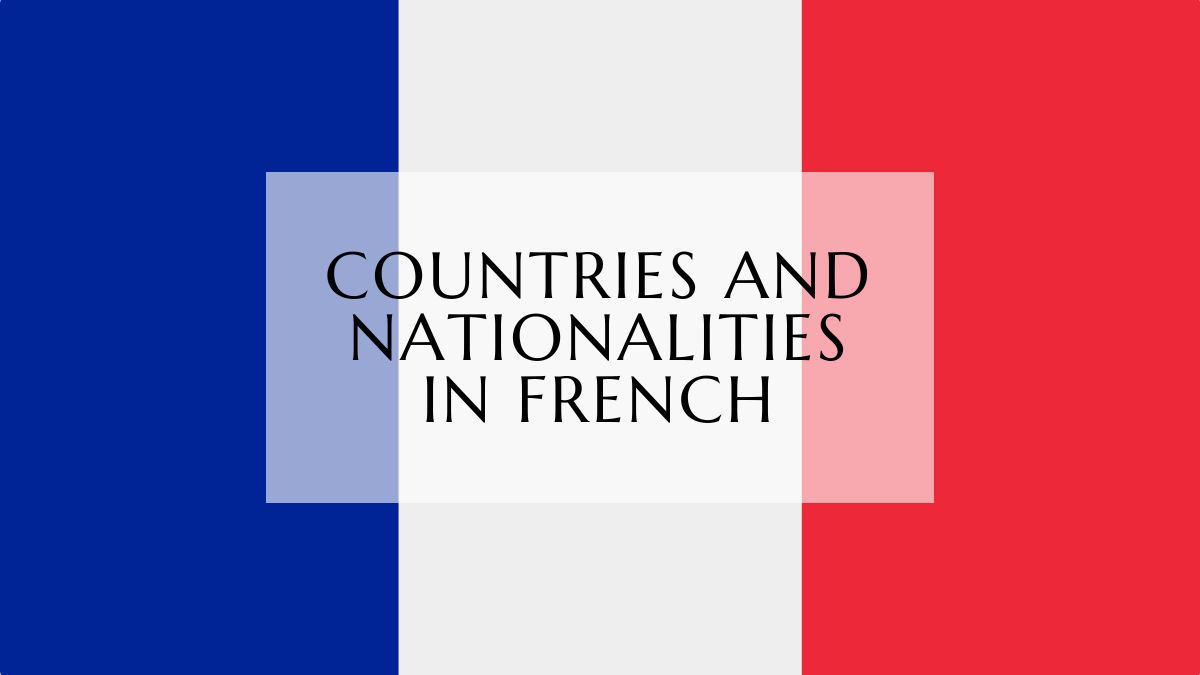Here is a list of the most common nouns in French, learning to use these 200 nouns is a great start for any beginner French learner who wants to build up their vocabulary.
Nouns enable you to talk about the people, places, and things around you. When learning some adjectives and verbs, you will be able to produce many meaningful phrases. So let’s get started!
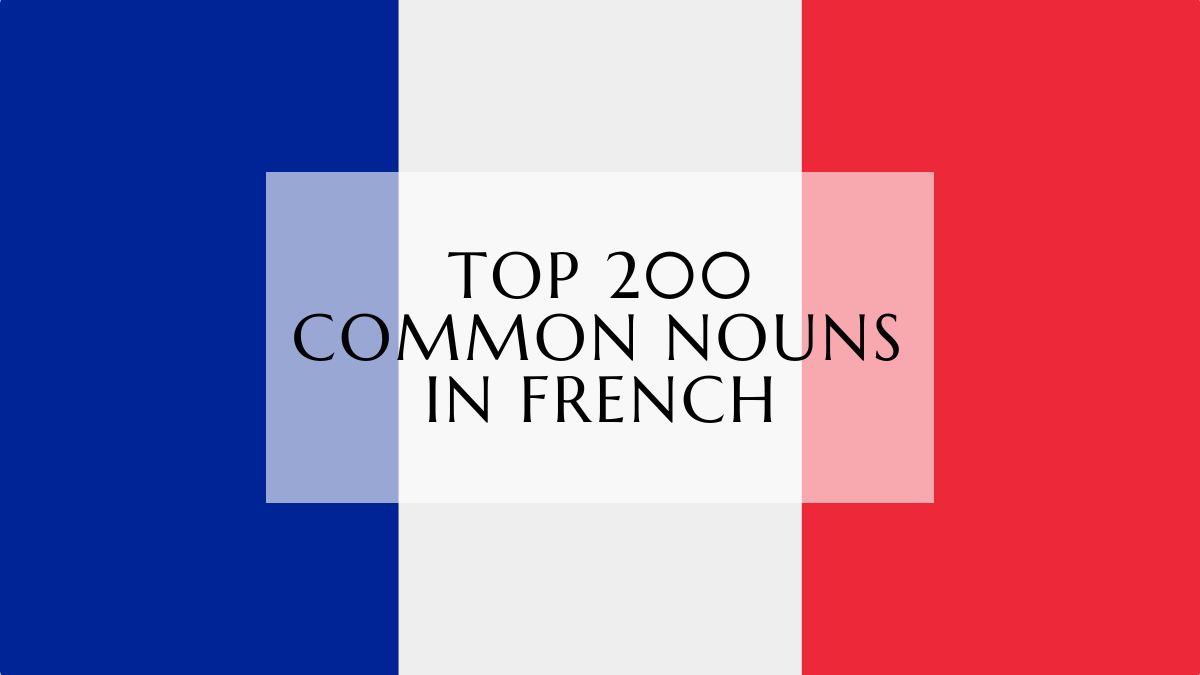
Most Common Nouns In French
| English | French |
| Area | Secteur |
| Art | Art |
| Body | Corps |
| Book | Livre |
| Business | Entreprise |
| Car | Voiture |
| Case | Cas |
| Change | Changement |
| City | Ville |
| Community | Communauté |
| Company | Entreprise |
| Country | Pays |
| Day | Jour |
| Door | Porte |
| Education | Éducation |
| End | Fin |
| Eye | Oeil |
| Face | Visage |
| Fact | Fait |
| Family | Famille |
| Father | Père |
| Force | Force |
| Friend | Ami |
| Game | Jeu |
| Girl | Fille |
| Government | Gouvernement |
| Group | Groupe |
| Hand | Main |
| Head | Tête |
| Health | Santé |
| History | Histoire |
| Home | Maison |
| Hour | Heure |
| Idea | Idée |
| Information | Information |
| Job | Travail |
| Kid | Gamin |
| Kind | Espèce |
| Law | Loi |
| Level | Niveau |
| Life | Vie |
| Line | Ligne |
| Man | Homme |
| Member | Membre |
| Minute | Minute |
| Moment | Moment |
| Money | Argent |
| Month | Mois |
| Morning | Matin |
| Mosque | Mosquée |
| Mother | Mère |
| Name | Nom |
| Night | Nuit |
| Number | Nombre |
| Office | Bureau |
| Others | Autres |
| Parent | Parent |
| Part | Partie |
| Party | Fête |
| People | Gens |
| Person | Personne |
| Place | Place |
| Point | Point |
| Power | Pouvoir |
| President | Président |
| Problem | Problème |
| Program | Programme |
| Question | Question |
| Reason | Raison |
| Research | Recherche |
| Result | Résultat |
| Right | Droite |
| Room | Chambre |
| School | École |
| Service | Service |
| Side | Côté |
| State | État |
| Story | Histoire |
| Student | Étudiant |
| Study | Étude |
| System | Système |
| Teacher | Professeur |
| Team | Équipe |
| Thing | Chose |
| Time | Temps |
| War | Guerre |
| Water | Eau |
| Way | Chemin |
| Week | Semaine |
| Woman | Femme |
| Word | Mot |
| Work | Travail |
| World | Monde |
| Year | Année |
Note: you can practice what you’ve learned here, and learn how to pronounce each of the words in our Memrise course here, don’t know how to use the platform or sign up? we’ve got you covered in this easy-to-follow tutorial here.
Relationships / People
| English | French |
| A person | Une personne |
| Boy/girl | Garçon/fille |
| Child | Enfant |
| Everybody | Tout le monde / tous / chacun |
| Father | Père |
| Friend | Ami |
| Husband | Mari |
| Man | Homme |
| Mother | Mère |
| Son/daughter | Fils/fille |
| Woman | Femme |
| Wife | Épouse |
Places
| English | French |
| Bathroom | Salle de bain |
| Here | Ici |
| House | Maison |
| Inside | À l’intérieur |
| Outside | À l’extérieur |
| Place | Place |
| Room | Chambre |
| There | Là-bas |
Days of the week
| English | French |
| Monday | Lundi |
| Tuesday | Mardi |
| Wednesday | Mercredi |
| Thursday | Jeudi |
| Friday | Vendredi |
| Saturday | Samedi |
| Sunday | Dimanche |
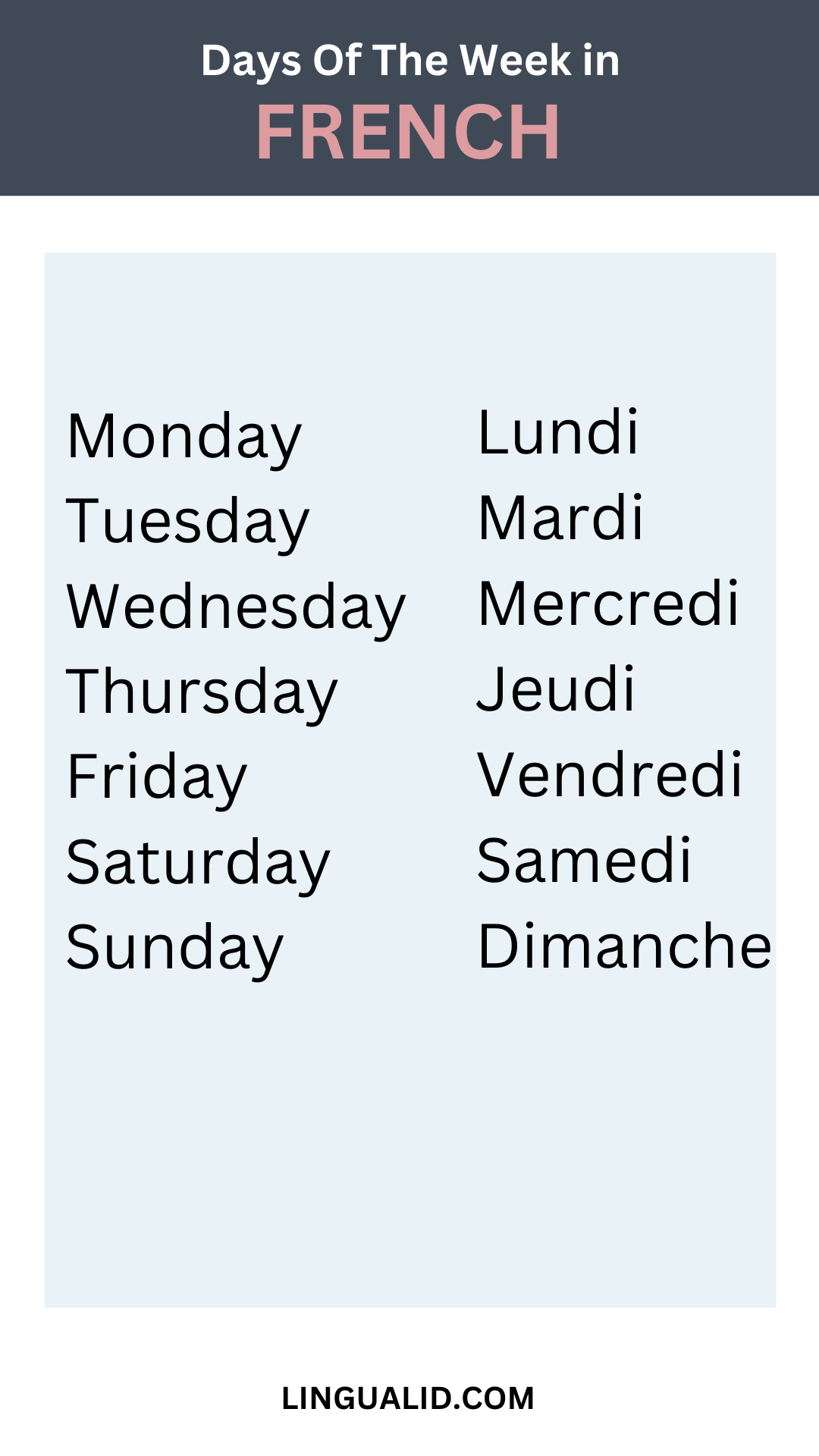
Time
| English | French |
| Day | Jour |
| First | Premier |
| Hour | Heure |
| Minute | Minute |
| Moment | Moment |
| Month | Mois |
| Never | Jamais |
| Now | Maintenant |
| Second | Seconde |
| Since.. | Depuis.. |
| Today | Aujourd’hui |
| Tomorrow | Demain |
| Until | Jusqu’à |
| Week | Semaine |
| Year | Année |
| Yesterday | Hier |
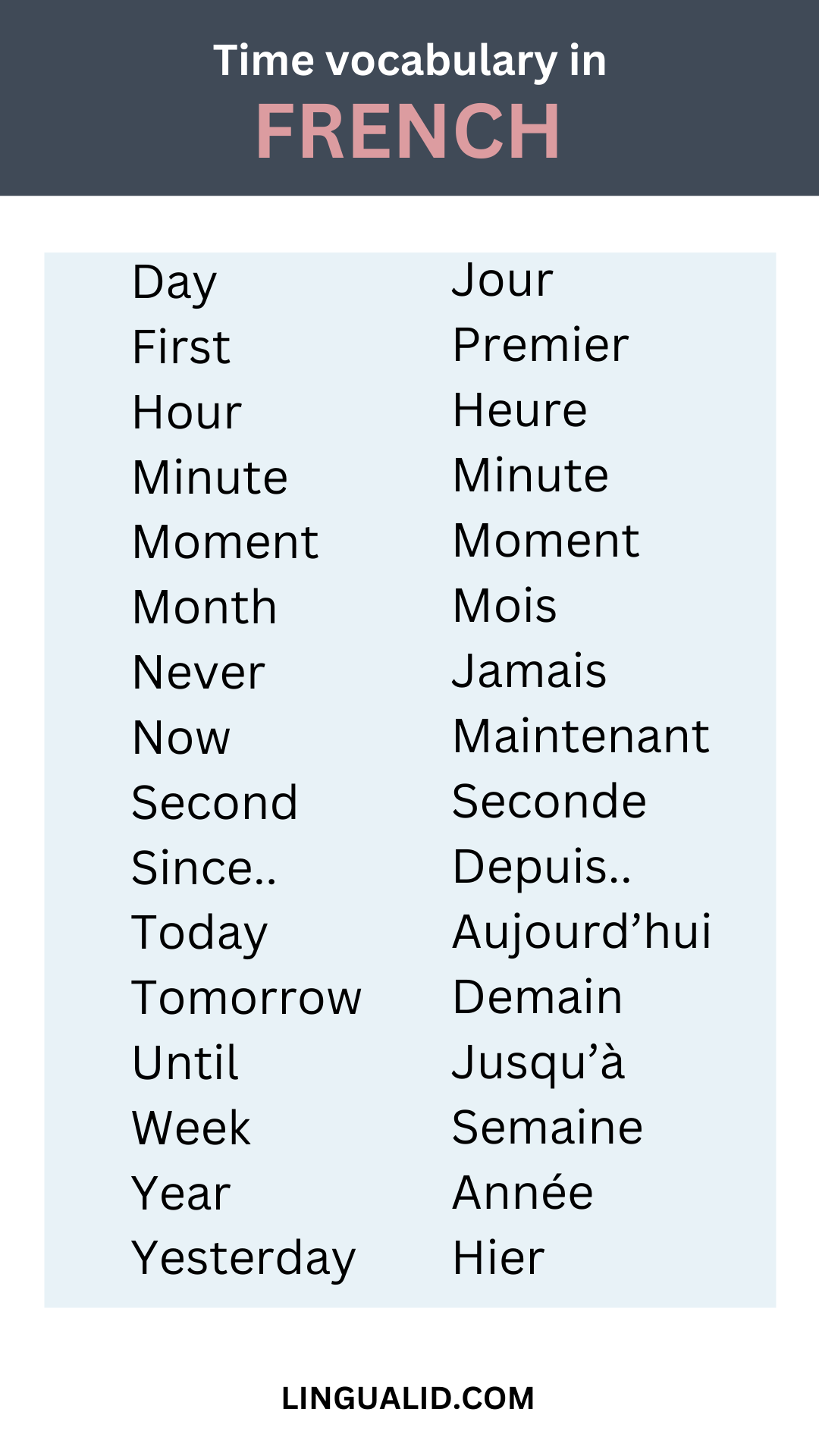
Conversational Vocabulary
| English | French |
| A few | Quelques |
| Against | Contre |
| Already | Déjà |
| An answer | Une réponse |
| And | Et |
| Behind | Derrière |
| But | Mais |
| Each | Chaque |
| Everything | Tout |
| Excuse me | Excusez-moi |
| For example | Par exemple |
| Half | Moitié |
| If | Si |
| Left (direction) | Gauche |
| Like this | Comme ça |
| Maybe | Peut-être |
| More | Plus |
| None | Aucun |
| Nothing | Rien |
| Only | Seulement |
| Opposite | Contraire |
| Okay | Bien |
| Perhaps | Peut-être |
| Possible | Possible |
| Really? | Vraiment? |
| Right (direction) | Droite |
| Something | Quelque chose |
| Still | Encore |
| The same thing | La même chose |
| There is | Il y a |
| There is not | Il n’y a pas |
| Thing | Chose |
| Together | Ensemble |
| Way | Chemin |
| When? | Quand? |
| Where? | Où? |
| Which? | Lequel? |
| Why? | Pourquoi? |
| With | Avec |
| Without | Sans |
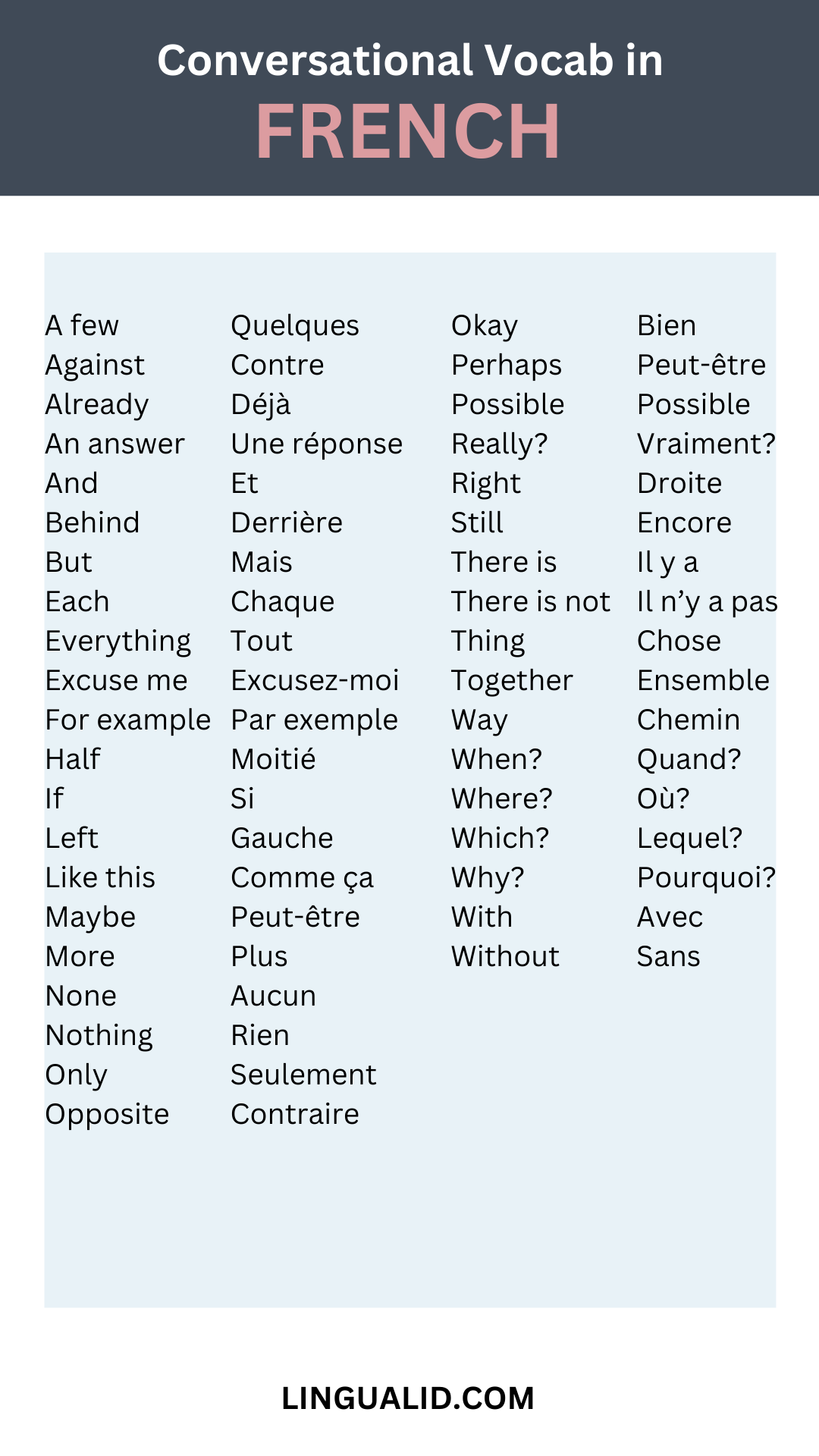
Ideas and interactions
| English | French |
| Also | Aussi |
| Bye | Au revoir |
| Good evening | Bonsoir |
| Good night | Bonne nuit |
| Good morning | Bonjour |
| Hello | Salut |
| How are you? | comment ça va ? |
| I agree | Je suis d’accord |
| I’m from.. | Je viens de.. |
| Mistake | Erreur |
| No | Non |
| Oh my God! | Oh mon Dieu ! |
| See you soon | À bientôt |
| Sentence | Phrase |
| Thank you | Merci |
| Word | Mot |
| Yes | Oui |
| You’re right | Tu as raison |
| You’re welcome | De rien |
| You’re wrong | tu as tort |
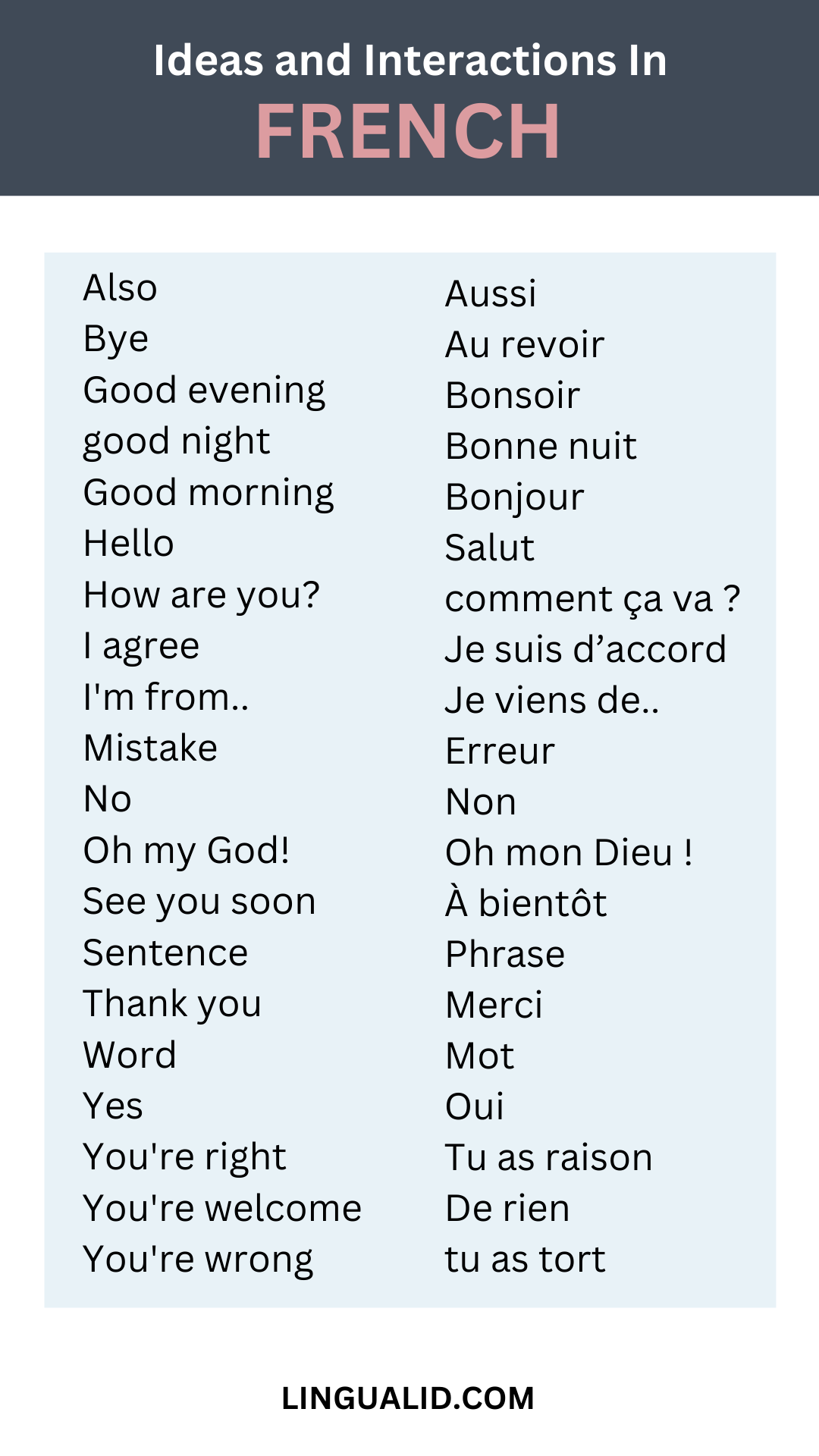
That was our list of the most common nouns in French, we suggest that you learn and study a few nouns every day and try to use them frequently.

French Common Nouns Study Guide
Quiz
Instructions: Answer the following questions in 2-3 sentences.
- What are nouns and why are they important for language learning?
- List three French nouns related to time and provide their English translations.
- What is the French word for “house,” and how is it used in a simple sentence?
- Differentiate between “homme” and “mari” in French.
- Translate the following phrase into French: “I am a student.”
- What are the French words for “yes” and “no,” and how do they compare to English in their usage?
- Provide the French translations for the following conversational phrases: “Good morning,” “Good evening,” and “Good night.”
- What is the French word for “friend,” and how does its pronunciation differ from the English word?
- Translate the following question into French: “Where is the bathroom?”
- List three French nouns related to education and provide their English translations.
Quiz Answer Key
- Nouns are words that represent people, places, or things. They are essential for language learning as they form the basic building blocks of sentences and communication.
- Jour (day), Semaine (week), Année (year)
- The French word for “house” is “maison.” Example sentence: “La maison est grande” (The house is big).
- “Homme” means “man” in a general sense, while “mari” specifically refers to a “husband.”
- “Je suis un étudiant” (masculine) or “Je suis une étudiante” (feminine).
- “Oui” means “yes,” and “non” means “no.” Their usage is similar to English, indicating agreement or disagreement.
- Good morning – “Bonjour,” Good evening – “Bonsoir,” Good night – “Bonne nuit.”
- The French word for “friend” is “ami.” The pronunciation differs in that the French “i” has a longer, more drawn-out sound compared to the short “i” in English.
- “Où sont les toilettes?” (formal) or “Où sont les WC?” (informal).
- École (school), Éducation (education), Professeur (teacher).
Get a pdf file of the top 200 French nouns and other 1000 essential French words now, write your email so we can send it to you:
Happy learning!
Oualid Cheddadi is the founder of Lingualid, a platform that inspires independent language learners worldwide, regardless of the language they are learning. The name “Lingualid” is derived from the Portuguese word for “language,” “língua,” and the last three letters of Oualid’s name, “Lid.”

